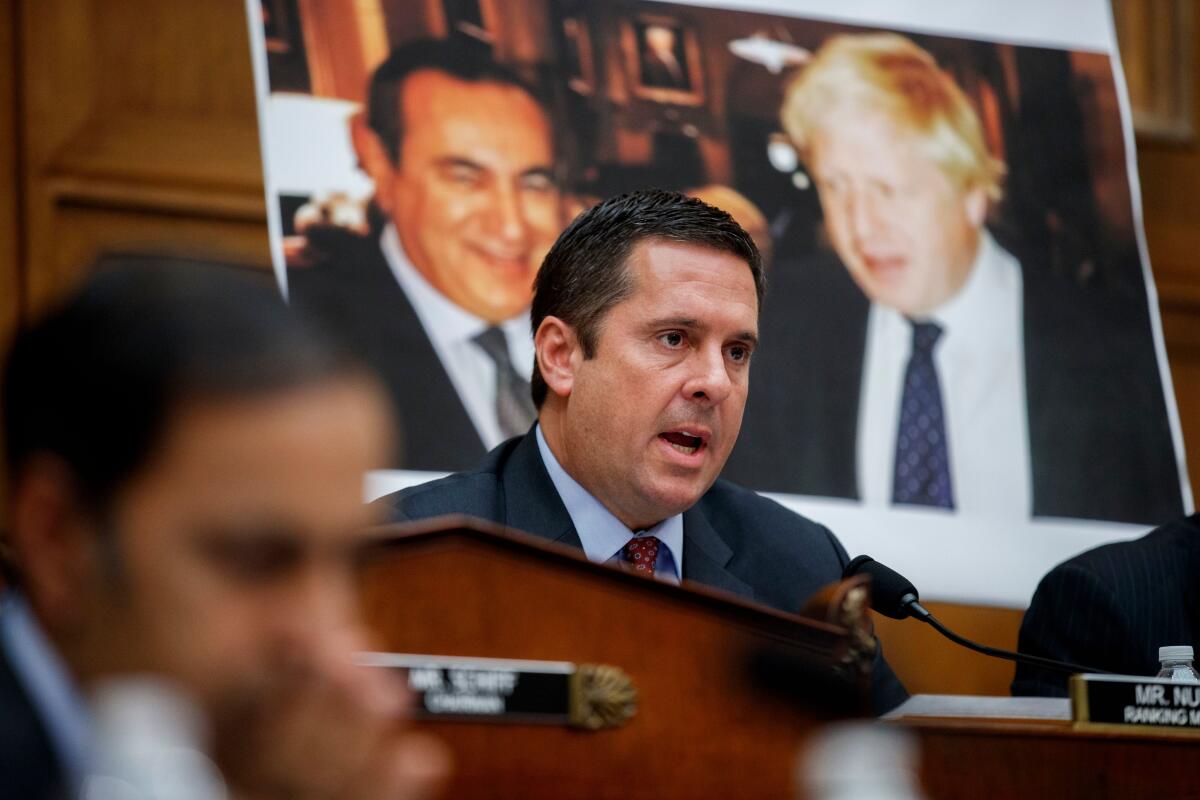A quick guide to GOP attacks against the credibility of Mueller’s inquiry

WASHINGTON — As Republicans tried to poke holes Wednesday in former special counsel Robert S. Mueller III’s report and testimony, they turned to a series of familiar attacks and conspiracy theories that have circulated widely in conservative media.
Here’s a quick rundown.
What is the Steele dossier and why do Republicans keep bringing it up?
In 2016, Hillary Clinton’s campaign and the Democratic National Committee hired former British intelligence agent and longtime FBI source Christopher Steele to gather damaging information about then-presidential candidate Donald Trump.
Steele’s report alleged that Trump’s election team was conspiring with Russia to swing the election in his favor. Steele’s memos also made unsubstantiated allegations of real estate deals intended as bribes and encounters that Trump had with Russian prostitutes.
The FBI eventually obtained the dossier. It said it corroborated some of Steele’s intelligence, but some of the information in the dossier hasn’t been confirmed.
Some Republicans argue that the dossier’s allegations against Trump led to the launch of Mueller’s probe. They contend that the dossier, with its links to the Clinton campaign, was a political tool, and that its alleged role in the start of the Russia probe reveals investigators’ anti-Trump bias.
Was the dossier really the impetus for the Russia probe?
No, that was George Papadopoulos. In March 2016, Maltese professor Joseph Mifsud told Papadopoulos — a Trump campaign advisor — that the Russian government had compromising material on Clinton. After a night of heavy drinking, Papadopoulos in May told Alexander Downer, Australia’s top diplomat in Britain, that he knew about this Russian “dirt.” Downer passed that tip onto the FBI.
Russian hacking, combined with the revelation that a Trump campaign aide might have received inside information about it, were key factors in the FBI’s decision to launch the Russia probe in July 2016. They began investigating whether Russia meddled in the election and whether anyone in the Trump campaign conspired.
What do Republicans mean when they talk about the FBI “spying” on private citizens?
They’re referring to the secret, court-approved surveillance of people connected to the Trump campaign.
In the fall of 2016, FBI and Justice Department officials asked for permission to monitor Carter Page — a former Trump foreign policy aide — on suspicion that he was acting as a Russian agent, which Page has denied.
Under the law, any such surveillance within the U.S. must first be cleared by judges on the Foreign Intelligence Surveillance Court, based on evidence that the target is working for a foreign power. FISA warrants for Page were repeatedly renewed by the court.
The filing by U.S. investigators listed a variety of reasons to believe Page was colluding with Russia, including the Justice Department’s past dealings with him. A former recruit for the Russian intelligence service, Page had an extensive network of contacts in Moscow.
In support of the surveillance warrant application, the FBI and Justice Department cited as evidence the reports produced by Steele. Those reports, compiled in July 2016, alleged that Page had “secret meetings in Moscow” with two associates of Russian leader Vladimir Putin, and that Page served as an intermediary in a conspiracy between the Trump team and Russia that was coordinated by former campaign chairman Paul Manafort.
But Republicans have portrayed Page as a victim of political bias by Justice Department officials seeking to prevent Trump from becoming president.
Didn’t Papadopoulos also claim something similar?
That’s right. In 2018, Papadopoulos was sentenced to two weeks in prison for lying about his Russian ties. He claimed that the intelligence community had conspired against him in an effort to sabotage Trump’s presidency.
Papadopoulos hasn’t cited evidence to support this claim.
What about claims that attorneys working for Mueller were pro-Clinton?
Some were, like Peter Strzok, an FBI agent who was working on the probe. In a series of text messages, he and Lisa Page — an FBI lawyer he was having an affair with — described Trump as an “idiot” and a “loathsome human.”
After finding out about these texts, Mueller removed Strzok from the Russia probe.
Some of the investigators on Mueller’s team are Democrats and donated to Clinton, but Mueller and everyone else in charge of the probe — including Rod Rosenstein, who appointed Mueller as special counsel — is a Republican. There is no evidence that political bias affected the investigation.
Facing claims from Republican lawmakers that his probe was biased, Mueller gave an impassioned defense of his team during his testimony Wednesday.
“I’ve been in this business for almost 25 years. In those 25 years I’ve not had occasion once to ask about somebody’s political affiliation,” Mueller said. “It is not done. What I care about is the capacity of the individual to do the job and do the job seriously and quickly and with integrity.”
More to Read
Get the L.A. Times Politics newsletter
Deeply reported insights into legislation, politics and policy from Sacramento, Washington and beyond. In your inbox three times per week.
You may occasionally receive promotional content from the Los Angeles Times.










